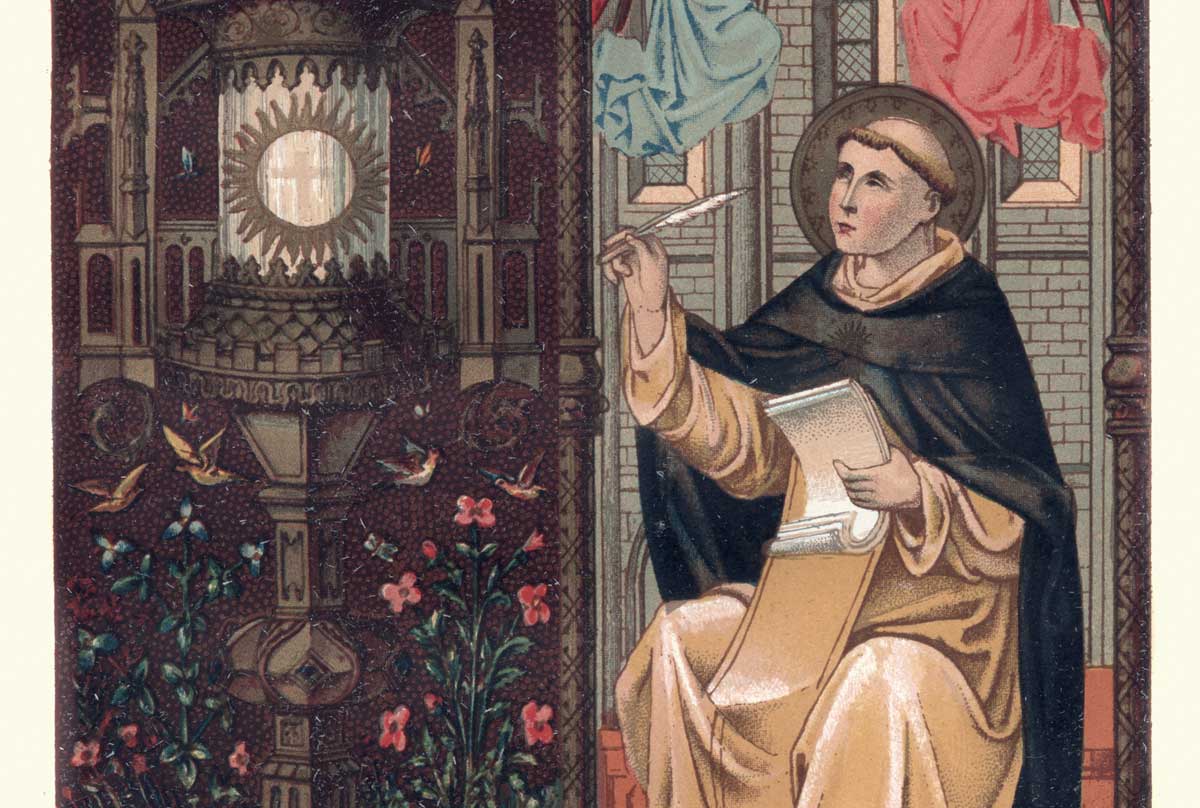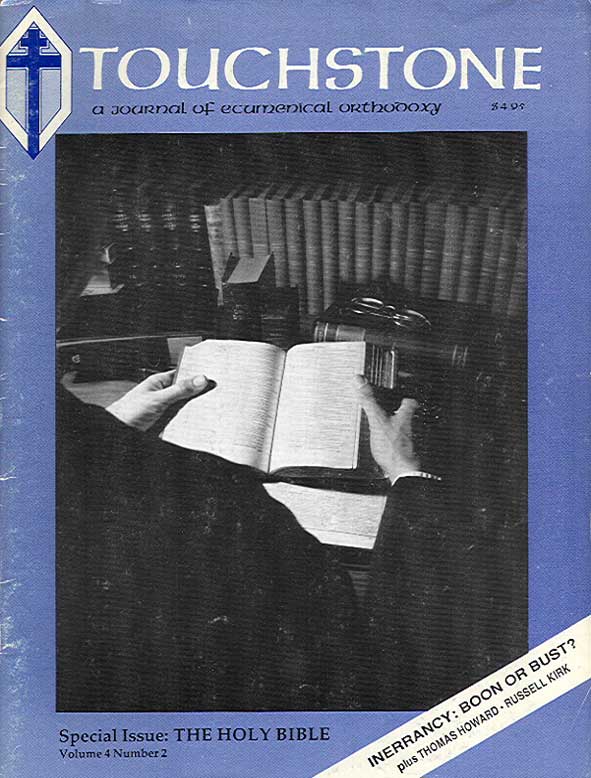Beyond Sola Scriptura
Recovering a More Balanced Understanding of Authority
by Victor L. Walter
In the theological battle over inerrancy of the Holy Scriptures late twentieth-century Protestants may at times obscure the practical issue of the authority of the Bible over the daily thought and life of the believer. The subject of this article is the nature of that authority of Scripture and its relationship to those other aspects of divine authority which should mark the lives of Christians—the echoing voice of historic Christian orthodoxy as expressed in the great ecumenical councils of the early undivided Church,1 and the effective headship of Christ in the context of living Church authority. Now this is a classic three-legged model of Christian authority and far less susceptible to doctrinal manipulation or distortion by heretics, cultists, or the ignorant than a flat view of sola scriptura, the “scripture alone.” As I reflect on this three-legged model, I am often tempted to insert a fourth leg of the teaching role of the Holy Spirit (John 16:13–15), though it is implicit in all of the other three. I will leave it to the reader to decide which multi-faceted model is more helpful. But let me review how this thinking worked itself out in point of historical fact in the early Church.
Not many in the early Church were inclined to challenge the concept of the divine inspiration of Scripture. The starting point for their definition of inspiration began in passages like 2 Timothy 3:16–17: “All Scripture is given by inspiration of God and is profitable for doctrine, for reproof, for correction, for instruction in righteousness, that the man of God may be complete, thoroughly equipped for every good work.”2 Unlike our own age, where the issue for many seems to be the reality of that divine breath of revelation, the issue in the early Church was to determine which books exactly should be included in the canon as divinely inspired. The late first- or the second-century “undershepherd”3 sat before a study table that had on it the Gospel of Matthew and the Gospel of Thomas, the Acts sent by Luke to Theophilus and the Acts of Peter, the Epistle to the Galatians from Paul and the First and Second Epistles of Clement. The burning issue for him was to answer definitively which were divinely inspired, that is, “God-breathed.” Early debaters of this issue resolved the problem gradually over the decades4 by applying the Holy Spirit’s teaching through Paul: that was to be considered genuine Scripture which proved unfailingly efficacious in the life of the Church to establish and maintain apostolic doctrine, which continually furthered righteousness and provided for the thoroughly equipped undershepherd. Eventually Matthew, Acts and Galatians were validated along with the other twenty-four books of the New Testament canon;5 and Thomas, Acts of Peter and Barnabas along with several dozen other assorted gospels and epistles were seen as non-canonical.
Thus the Holy Bible, which we may say serves us as the first plank in our Christian platform of authority, was clearly set in place as the local churches of the Roman Empire gradually worked out the Pauline dictum in daily ecclesiastical life. This gave rise to a later corollary expressed by Roman Catholics in their suggestion that it was the Church’s preservation of Divine Tradition out of which the Scriptures come.6 This suggestion has always left Protestants a bit uneasy. And while I can appreciate this feeling of uneasiness, I think that its source is our failure as American Protestants to know the history which we are in part discussing in this article. It seems to me that we need to come back to that historical process which led to the famous rule-of-thumb for doctrinal authority stated by Vincent of Lerins (prior to the synod of Orange in 529) that, “all possible care should be taken . . .” to “. . . hold that faith which has been believed everywhere, always, and by all.”7 This dictum highlighted the next significant issue in regard to Christian authority. That issue was the right interpretation of those authoritative canonical Scriptures.
At this point a second passage of Scripture charted the channel through which the flood waters of this controversy over the right doctrinal interpretation (drawn from the Scriptures) were to run. That passage was 2 Peter 1:19–21:
And so we have the prophetic word confirmed, which you do well to heed as a light that shines in a dark place, until the day dawns and the morning star rises in your hearts; knowing this first, that no prophecy of Scripture is of any private interpretation, for prophecy never came by the will of man, but holy men of God spoke as they were moved by the Holy Spirit.8
The line of reasoning seems plain here. Since none of the confirmed Scriptures came by the private and inventive will of man, but rather by way of the dictating or directive will of the Holy Spirit; therefore, none of the interpretation of these same Scriptures is to come by the private, individualistic, inventive will of man.9 If that is the case, where must one look for the proper interpretation of Holy Writ’s teachings? Emphatically the early Church answered that interpretation would be public within the Church. (Remember, the Apostle Paul says the Church is to be “the pillar and the bulwark of the truth.” [1 Tim. 3:15]) There were and would be no secret mysteries to Christianity known only to the exalted and favored few. Jesus taught in the public arena; the apostles lived, preached and died publicly; and saving faith was indeed for whosoever would respond and indeed a little child could lead in that response.10 They assumed quite naturally that public meant in the open ecclesiastical arena, not in the pagan schools of this or that secular philosopher. Therefore, under the Holy Spirit’s tutelage the Church would publicly set the interpretation of the Scriptures just as she had originally publicly selected the individual books of the canon. This understanding was undergirded by the promise in the Gospel of John that
. . . when He, the Spirit of truth, has come, He will guide you into all truth; for whatever He hears He will speak; and He will tell you things to come. He will glorify Me, for He will take of what is Mine and declare it to you. All things that the Father has are Mine. Therefore I said that He will take of Mine and declare it to you. (John 16:13–15)
The battle line that developed was over the question of just who was “the Church” and by what mechanism or agency within the Church would this dominical promise be kept. Later Roman Catholicism would answer that question emphatically by asserting the teaching magisterium of Peter continued in the pope at Rome.11 However that developmental strand at Rome was strong enough to agitate the North African church as early as the Severan persecution and the patriarchate of Cyprian at Carthage, A.D. 248–258. Writing his great Christian classic, De Unitate, our earliest treatise on the Church’s nature, Cyprian countered certain Roman claims and expressed the earliest impulse of the Church by insisting that the Church was her bishops or undershepherds in counciliar aggregate.12 One man alone was not entrusted with this power of definition, but rather the gathered, hence ecumenical, Church in the persons of her undershepherd bishops would be the final voice in interpretation.
It was this early answer defended by Cyprian which was expressed in the roster of ecumenical councils and which Protestants would much later rearticulate in their disallowance of a papal sovereignty over doctrine or practice. It was these councils which defined the cardinal doctrines of the Trinity, the Incarnation, the nature of Christ Jesus, the relationship of atonement and Deity, and marked out that plethora of early Church heresies which were to be shunned. It is the doctrinal decisions of these ecumenical councils which Protestantism accepted as historic orthodoxy.
So along with the defined canon of Scripture, the second aspect of authority to which every Christian must bow is the dogma promulgated by the ecumenical councils as the orthodox interpretation of Scripture. This means that only the heretic is apt to be found arguing “Scripture alone.” Thinking Protestants defend the authority of Scripture and the authority of the historic counciliar dogmatic norm as their basis for dogma or doctrine. In fact, all orthodox Protestants do this instinctively whether they recognize the councils or not.
Therefore, without in any way diminishing the final authority of the Holy Scriptures for both faith and practice, the Protestant theologian also accepts and insists upon the dogmatic and interpretive authority of the ecumenical councils, the so-called historic and orthodox norm. And perhaps for us American Protestants this is the crucial center and our own point of confusion. Our rejection of the Jehovah’s Witnesses doctrinal slighting of the Trinity may serve as a case in illustration. The Jehovah’s Witnesses take the slogan sola scriptura utterly literally. Thus from certain select words of Scripture they will teach that Jesus Christ was the first created being and the Holy Spirit is divine influence rather than Divine Person. When we confront and confute the Jehovah’s Witnesses, we use the totality of Scripture as understood and formulated by the councils in the doctrine of the Trinity. Certainly the Scriptures are the point-of-beginning authority, but if we acknowledge the shaping, formulating voice of the councils as well, we would save ourselves our confusion. This dual authority stands clearly suggested by Paul in 2 Thess. 2:15, when he exhorted, “Therefore brethren, stand fast and hold the traditions which you were taught, whether by word or our epistle.”
However, if authority ends in the printed page (be it Scripture or dogmatic history) the Protestant house will be left lifeless and bare, and contemporary Protestants will find themselves Pharisees reborn. Jesus himself reminded that original group of Pharisees that to search the Scriptures, endlessly categorizing them, while refusing to come to him, was to miss life. (John 5:39–40) Therefore, one must insist that scriptural authority and dogmatic authority must be related to the vital, living authority of the Holy Spirit and to the headship of Christ if modern Protestants are to be living and dynamic women and men under authority. The Evangelical Protestant insists that the so-called “born again” must be under the authority of the indwelling Spirit of God. Here is the lordship of Christ exercised in our midst as those who reverence the Scriptures and believe rightly also obey the Spirit moment by moment.
So one further facet of authority must also be noted if for no other reason than contemporary Protestant Christians so often ignore it—that is the practical experience of the headship of Christ. This headship is exercised in the local church through its local government—by which I do not mean to suggest one form of polity over another. I am simply insisting, however unpalatable to many a modern mind it may be, that the headship of Christ is only reflected in local community polity.
In insisting on this and acknowledging frankly that Cyprian reflected the close-to-universal-opinion of primitive Christendom when he asserted the bishop was that local government,13 I am not trying to make a brief for the form local church government must assume today; I am simply pointing out that the lordship of Christ is individual, while his headship is collective.14 This is to insist that no person knows aught of that headship if he or she is not in submission to his or her local church government. It is to insist that the full-orbed understanding of authority under which Christians live must include that vital, concrete and practical headship of Christ.
That such a full-orbed concept of authority is more complicated than the simple cry, “Scripture alone,” is beyond denying. But it does seem to this writer that it is also beyond denying that the land is filled with grievously ill local fellowships of believers who have sabotaged their own local church through a truncated concept of the authority under which we, as believers, live. One can liken that authority to a three- (or four-) legged stool. As long as all the legs are in place (the fully authoritative Scripture, the dogmatic historic norm, the headship of Christ over the local body, and, of course, the indwelling of the Holy Spirit), the Christian may stand secure and reach toward his lost and dying world compatriots. To argue over the priority or relative importance of one leg over another may be semantic futility for, practically speaking, to kick out a leg or to suddenly lengthen or weaken one or another is to run the danger of toppling that once-secure Christian into ineffectiveness.
Notes:
1. Council of Nicaea, A.D. 325, which settled that the Trinity is three Persons but one substance.
Council of Constantinople, A.D. 381, protected the Nicaean formula, insisting that the Holy Spirit was of the same substance of God and a person in the Godhead.
Council of Ephesus, A.D. 431, which reaffirmed the Nicaean formula and debated the manhood and godhood of Jesus.
Council of Chalcedon, A.D. 451, which settled the formula of one person, two natures to explain Jesus.
Council of Constantinople II, A.D. 553, which protected the deity of Jesus by condemning Origen and Nestorianism, and keeping the Chalcedonian formula on Jesus.
Council of Constantinople III, A.D. 680–681, which protected the Chalcedonian formula on Jesus by insisting there were both a human and a divine will in Jesus.
Council of Nicaea II, A.D. 787, which was basically devoted to the controversy in the East over icons; the council differentiated between reverence granted an icon and adoration granted God; the council was insignificant to the West.
Council of Constantinople IV, A.D. 869, which covered no fundamental doctrinal issues, but prohibited interference in the elections of bishops and thus became important in the later controversies with the pope in the West.
Many Protestant theologians accept these eight councils as formative and normative for historic orthodoxy. Martin Luther was inclined to accept only the first four. Councils Nine (Lateran I, 1123) and on occurred after the 1054 East-West break and have never been accepted as normative by non-Roman Catholics.
2. All Scripture quoted in this article is from the New King James Version, Nashville: Thomas Nelson Publishers, 1985.
3. I have chosen to use undershepherd here rather than our modern “priest” or “pastor” because these latter phrases suggest controversy, local church polity issues, salaries, and so forth. While here we want to suggest the early Church teacher-leader met under the New Testament terms presbyter (elder) and episcopos (bishop/overseer).
4. The first listing known to history which embraced all twenty-seven books of the New Testament as we know it (and listed no other items) was a festal letter of Athanasius, bishop of Alexandria, dated A.D. 367. It was not until thirty years later in 397 when the Council of Carthage actually officially acted on such for its area.
5. Without any serious equivocation the early Church universally accepted the Jewish canon of the thirty-nine books of the Old Testament officially confirmed by the Rabbinical Councils of Jamnia in A.D. 90 and 118. The Old Testament was to be interpreted in the light of the New Testament.
6. George D. Smith, Ed., The Teaching of the Catholic Church, Vol. I, pp. 28–31, New York: The Macmillan Company, 1955.
7. “Quod ubique, quod semper, quod ab omnibus.” Kenneth Scott Latourette, A History of Christianity. New York: Harper & Row, Publishers, 1953, p. 182.
8. It needs to be acknowledged here that textual authorities who wish to assign the second Petrine Epistle to second-century dates or later (the first-known mention of the epistle by name was by Origen in A.D. 240) might wish to argue that this passage was more reflective of (rather than formative for) the interpretation debate. However, the point would remain the same that this passage charts that rough process of interpretation for us. This writer accepts the apostolicity of 2 Peter, however.
9. What I am suggesting here is that we Protestants need to acknowledge that the final interpretation of Scripture for public teaching cannot be left to individualistic, self-serving expounders with a “new truth” to proclaim—therein all heresies are birthed. I am also suggesting that this in no way impinges on the power of the Holy Spirit to apply all or any Scripture to us in highly individualistic or even unique fashion. What I am insisting upon here is that such individualistic insight/application is not the base for public teaching and exhortation.
10. Perhaps the primitive Church’s battle with the various forms of Gnosticism from around A.D. 90 to 200, with the multifaceted claims of secret gospels and mysteries only for the elite or “the spiritual” served to confirm the early Church’s insistence that saving doctrine was publicly delivered and publicly known. No one articulated this better for the young Church than the bishop of Lyons, Irenaeus. His great work, Against Heretics, is available in several fine English translations and it is commended to the reader. Here let us simply cite two statements:
The tradition of the Apostles, therefore, manifested in the entire world, it is possible for all, who wish to see the truth, to contemplate clearly in every church; and we are in position to enumerate those who were by the apostles instituted bishops in the churches, and the successions of these men to our own times; those who neither taught nor knew anything like the ravings of the heretics. And in fact if the apostles had known hidden mysteries, which they were in the habit of imparting to “the perfect” apart and privily from the rest, they would have delivered them especially to those to whom they were also committing the churches themselves. (III.3,1)
As I have already observed, the Church, having received this preaching, and this faith, although scattered throughout the whole world, yet, as if occupying but one house, carefully preserves it. She also believes these points of doctrine just as if she had but one soul, and one and the same heart, and she proclaims them, and teaches them, and hands them down, with perfect harmony, as if she possessed only one mouth. (I.2,3)
(From the collection edited by J. Stevenson, A New Eusebius, London, S.P.C.K., 1965, pp. 117–118, and 115 respectively.)
11. This culminated in the dogma of Papal Infallibility promulgated by Vatican I, 1870, and Pope Pius IX.
12. See, for example, G. S. M. Walker, The Churchmanship of St. Cyprian, Chapter III, “The Collegiality of Bishops,” pp. 33–47, Richmond, Virginia: John Knox Press, 1968. “But according to Cyprian, the Petrine position was not perpetuated with reference to the church universal, since only the local congregation has a single head on earth. In the beginning there had been no more than one congregation, with Peter chronologically pre-eminent; as congregations multiplied, each came to possess a Peter in the person of its own bishop; but they remain a spiritually united group of separately independent cells, and there can be no super-church with a ‘super-Peter’ at its head.” (p. 33)
13. In the primitive Church probably no one stated this more emphatically than Ignatius, bishop of Antioch, in the seven of his letters which are still extant.
14. While the concepts of the lordship and headship of Jesus Christ certainly overlap, one can see something of their distinction in such a passage as Ephesians 5. In verse one Paul terms Christ our sacrifice. Therein stands his saviorhood. (Paul argues next for the avoidance of empty words, thereby implying the authority of those Spirit-filled words of Scripture.) In verses 17 and 18 Paul calls for being filled with the Spirit and understanding the will of the Lord; herein lies Christ’s lordship. Before moving on to his comparison of marriage and Christ and the Church, the Apostle enjoins (verse 21) submission to one another in the fear of God. This is inevitably how that headship of Christ (verse 23) will be practically realized. So what we are saying is that our Lord’s lordship is realized through the infilling of and our obedience to the Holy Spirit in such areas of life as our daily walk, our marriage and our own family. However, his headship is collective by its very nature for he is head of the Church; therefore this headship is submitted to in the context, not of one’s individual life, but of one’s own local church (collective/community) life.
Rev. Victor L. Walter is currently the pastor of Cheyenne Evangelical Free Church (Cheyenne, Wyoming) and served on the faculty of Trinity Evangelical Divinity School (Deerfield, Illinois) from 1973 to 1981.
subscription options
Order
Print/Online Subscription

Get six issues (one year) of Touchstone PLUS full online access including pdf downloads for only $39.95. That's only $3.34 per month!
Order
Online Only
Subscription

Get a one-year full-access subscription to the Touchstone online archives for only $19.95. That's only $1.66 per month!
bulk subscriptions
Order Touchstone subscriptions in bulk and save $10 per sub! Each subscription includes 6 issues of Touchstone plus full online access to touchstonemag.com—including archives, videos, and pdf downloads of recent issues for only $29.95 each! Great for churches or study groups.
Transactions will be processed on a secure server.
more from the online archives

23.6—November/December 2010
Darwin, Design & Thomas Aquinas
The Mythical Conflict Between Thomism & Intelligent Design by Logan Paul Gage
calling all readers
Please Donate
"There are magazines worth reading but few worth saving . . . Touchstone is just such a magazine."
—Alice von Hildebrand
"Here we do not concede one square millimeter of territory to falsehood, folly, contemporary sentimentality, or fashion. We speak the truth, and let God be our judge. . . . Touchstone is the one committedly Christian conservative journal."
—Anthony Esolen, Touchstone senior editor








